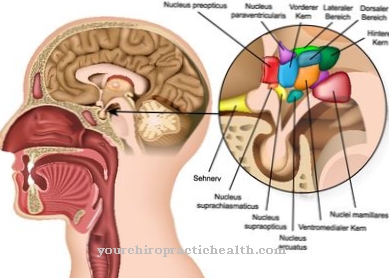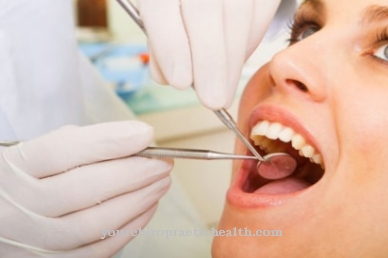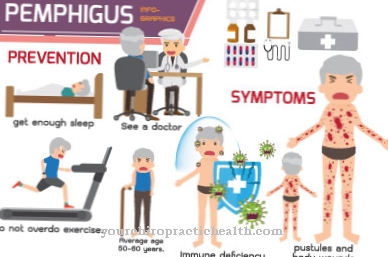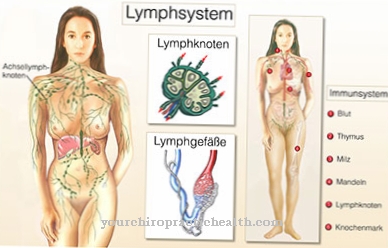Genital herpes or Genital herpes is an infectious disease caused by herpes viruses. At the same time, genital herpes is one of the most common sexually transmitted diseases.
What is genital herpes?
.jpg)
Genital herpes or genital herpes is a sexually transmitted disease that is triggered by herpes viruses.
The same viruses are also responsible for causing cold sores. Genital herpes is mainly transmitted through unprotected sexual intercourse.
In some cases, the child may become infected with the virus at birth from the mother. Herpes diseases are treated with the virus-inhibiting active ingredient acyclovir.
About 10 to 20 percent of the population in Germany are affected by the herpes simplex virus type 2 (HSV-2).
causes
Genital herpes triggers are the two types of herpes simplex viruses HSV-1 and HSV-2. Both types can cause both genital herpes and herpes labialis (cold sores). Genital herpes is one of the most common sexually transmitted diseases worldwide. It is estimated that between 20 and 30 percent of the world's population carry the herpes virus.
After the initial infection, herpes viruses slumber unnoticed in the nerve cells of the spinal cord. If the immune system is intact, the herpes viruses do not trigger any symptoms. However, if the immune system is weakened, the virus reactivates and herpes outbreaks. The causes for a weakening of the immune system can for example be cancer, bacterial infections, stress, injuries or mechanical irritation of the nerve knot infected with the virus.
The first infection occurs through direct contact during sexual intercourse or through smear infection, for example when using the same towel with an infected person. The initial infection can go unnoticed and almost asymptomatic.
The herpes viruses penetrate the body through the mucous membrane of the genitals or the oral cavity and follow the nerve pathways. In the nerve cells they hide in the nucleus and are therefore invulnerable to the body's own immune system.
Symptoms, ailments & signs
In some cases, genital herpes is symptom-free and therefore goes unnoticed. Other sufferers have clear symptoms that usually appear in bursts and last for a few days. Weeks without symptoms follow after a relapse. After infection with genital herpes, the first episode of the disease usually occurs after a period of two days to two weeks.
A characteristic symptom of genital herpes is the appearance of fluid-filled, sometimes very painful, small blisters with a red halo. If these burst open, encrustation and scab formation occur. The skin on the affected areas is very red and swollen. As a rule, this is also associated with significant itching and burning. Some people also have discharge (fluoro vaginalis) and painful urination.
The vesicles typically first appear on the labia, vagina, or penis, but can then spread through the anus and thighs. In people with a weakened immune system, it can also happen that the internal organs are affected. Fever and swollen lymph nodes also rarely occur. In the worst case, this can lead to death.
Diagnosis & course
The symptoms when the herpes virus reactivates (secondary infection) is severe itching in the genital area, small, painful blisters on the mucous membrane that are partially filled with pus, and swollen lymph nodes in the adjacent groin area. Genital herpes can also cause discharge. Genital herpes is diagnosed in the laboratory by taking a swab from the contents of the vesicles.
Secondary consequences of genital herpes can be inflammation of the vagina or the glans penis. A smear infection can also infect the intestinal mucosa. The herpes virus plays an important role in the development of cervical cancer. Doctors suggest that genital herpes infection may be a risk factor for cervical cancer.
The virus can affect the central nervous system or internal organs, which can lead to serious complications. However, these cases are very rare.
Complications
If a herpes infection in the genital area is treated in time with antiviral agents, the likelihood of complications is low. They can then only occur in people with a weakened immune system. In general, herpes simplex viruses can spread to many other organs if there is a lack of defense in the body.
In principle, they can affect all organs that are crossed by nerve fibers, because the two forms of the herpes virus rest in them for a lifetime.
Complications that imply an attack on the retina of the eye, the liver, the esophagus or other organs occur in almost all cases due to a reactivation of the herpes simplex virus. This can happen weeks, months or even years after an initial infection and even after treatment.
Genital herpes can also spread acutely to affected skin areas in the genital area. Inflammation, psoriasis and other irritations are easy entry points for the viruses and thus ensure that the clinical picture extends to the skin. If left untreated, this can lead to sepsis.
In addition, an active genital herpes infection during pregnancy can, in the worst case, pass to the child. The infection then affects internal organs, the skin and, in the worst case, the central nervous system. Infection from mother to child can also occur during childbirth.
When should you go to the doctor?
If you notice severe itching and painful pus blisters in the genital area, it may be genital herpes. A doctor should be consulted if the symptoms do not go away on their own after two to three days at the latest.
If there are additional symptoms such as discharge or swelling of the lymph nodes, professional advice should be sought immediately. Even a sudden, strong feeling of illness in connection with skin changes in the genital area indicates a serious illness that must be clarified and treated.
If not treated, the herpes virus can affect other parts of the body and organs. A doctor's visit is indicated at the latest when symptoms of the liver, kidneys, esophagus, eyes or skin are noticed. Pregnant women with suspected genital herpes should speak to the gynecologist immediately. People who suffer from an immune system disease should also have their symptoms clarified.
The same applies to older people and people who can attribute these symptoms to sexual intercourse. Parents who notice such signs in their child should see the pediatrician. In case of doubt, the emergency medical service can be contacted first. The symptoms can be clarified by talking to a specialist and further steps can be taken.
Doctors & therapists in your area
Treatment & Therapy
Genital herpes is usually treated with antiviral drugs such as acyclovir or famciclovir. The active ingredients are available as ointments for external local treatment and as tablets for oral use. In the case of a mild form of genital herpes, applying the aciclovir ointment is usually enough to bring the disease to subside.
However, if the symptoms are more pronounced, treatment with acyclovir tablets must also be carried out to stop the herpes virus from multiplying. In very severe cases, the agent can also be injected intravenously. The medication is only available on prescription; a visit to the doctor is essential for genital herpes.
The simultaneous treatment of the sexual partner is also very important in order to avoid re-infection.
However, the antiviral drugs cannot completely eradicate the virus. It remains in the body for a lifetime and can be reactivated at any time if the immune system is weakened. In individual cases, children or seriously ill patients whose immune system is not yet fully developed or weakened can become infected with the herpes viruses throughout their bodies.
Outlook & forecast
Genital herpes has a good prognosis. The pathogens are very contagious and can easily be passed on to other people. At the same time, they can also be combated and killed well in drug treatment. Timely and professional medical care is important for a favorable prognosis.
A special ointment should be applied to the affected areas at the first signs of genital herpes so that the pathogen is killed off quickly. If the cold sore bursts, the disease spreads further. New vesicles form, which delay the healing process.
Genital herpes heals completely without medical treatment. The symptoms usually regress within seven to ten days. After about two weeks, the person affected will experience no symptoms. This way is usually more arduous and associated with more inconvenience. In addition, the time the risk of infection is increased for other people.
Despite the good prognosis, most people will recur in the course of their lives. Genital herpes also has good prospects of recovery if it breaks out again. Often, based on the experience gained, the patient reacts more quickly to the first signs and can then achieve a shortening of the recovery process.
prevention
The prevention of genital herpes has two main focuses. Since the transmission mainly takes place during sexual intercourse, sufficient protection by condoms with frequently changing sexual partners and adequate sexual and genital hygiene must be ensured.
If a genital herpes infection is known, prevention is to strengthen the immune system so that the virus does not reactivate and cause another outbreak. You can strengthen your own immune system with simple means:
With enough sleep, avoidance of stress, a healthy, varied and vitamin-rich diet, a healthy lifestyle and regular exercise. Health, joie de vivre and a sense of wellbeing are the guarantee for a well-functioning immune system.
Aftercare
A number of treatments have been developed over the years that provide effective relief from the symptoms of genital herpes. The following treatments can relieve the pain and discomfort associated with genital herpes sores. Salt baths, used to wash the genital area, can cleanse, soothe, and dry the wounds. Use a teaspoon of salt in 600 ml of water or a handful in a shallow bath.
Pain relievers include simple analgesics (such as aspirin and paracetamol), ice (which can be soothing when applied directly to the wounds), and creams with a numbing component. However, creams can slow down drying and should therefore be used sparingly and only for pain relief. Loose underwear, preferably cotton (not nylon), can help minimize herpes symptoms and allow healing.
For anyone who experiences extreme pain while urinating - sitting in a warm bath or filling a pump bottle with water and spraying water on themselves while urinating can make the process less painful. It is extremely important to drink plenty of fluids as this will dilute the urine and thus minimize the painful urination.
You can do that yourself
Since genital herpes is a viral infection, those affected should always make sure that they have a stable immune system. Sick people can support their immune system through a healthy diet and adequate exercise.
This also includes adequate sleep, reducing stress and avoiding toxins and pollutants. The consumption of nicotine, alcohol and drugs as well as the abuse of medication are prohibited. The body weight should be in the normal range. A diet rich in vitamins and low in fiber is highly recommended.
Those affected often complain that the cause of genital herpes is triggered by individual psychological factors. Even if there is insufficient scientific evidence, the personally suspected triggers should be avoided. At the first signs of an outbreak of the disease, it is advisable to use medical products or appropriate home remedies as soon as possible.
The virus spreads within a few hours, so that first aid for the further course of the disease is very important. The clothing worn in the affected area must be disinfected. The fingers should also be cleaned thoroughly at regular intervals.
Great care should be taken to avoid transmission to other people or other parts of the body. The use of public baths or sexual intercourse should be avoided as far as possible due to the risk of infection until healing.



























